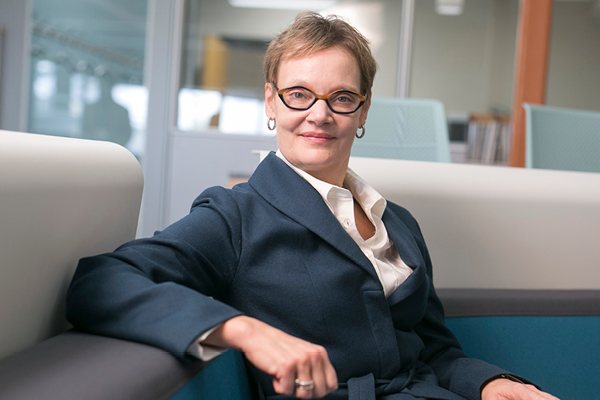
JSGS expert appointed to an international working group focused on identifying governance solutions for a safe and just planet
Margot Hurlbert, Canada Research Chair in Climate Change, Energy and Sustainability Policy and professor in the Johnson Shoyama Graduate School of Public Policy, has been appointed to the Earth Commission's Transformations Working Group.
By Erica Schindel, Communications and Marketing ManagerProtecting the earth’s ecosystem, such as biodiversity, freshwater, oceans and lands, is equally as vital as supporting the future wellbeing of all people, says a recent news release issued by the Earth Commission, part of the Global Commons Alliance—a partnership of more than 50 of the world’s most forward-looking organizations in philanthropy, science, business, and advocacy.
As part of its work, the Earth Commission has appointed 16 leading experts in earth systems governance, from around the world, to a Transformations Working Group. Among them is Margot Hurlbert, Canada Research Chair in Climate Change, Energy and Sustainability Policy and professor in the Johnson Shoyama Graduate School of Public Policy. Margot also conducts energy policy research with the Centre for the Study of Science and Innovation Policy.
Together, they will investigate the socio-economic drivers that are increasing climate risks and threatening biodiversity, while considering trade-offs between social and environmental goals for sustainability.
“The most exciting, but also challenging, part of our work is that we will weave together the ideas of what is safe from an environmental perspective, and what is just from a social perspective and how these relate to each other,” says Joyeeta Gupta, co-lead of the Transformations Working Group (TWG).
“We will also look at how we can bridge the gap between what is necessary to create a safe future and what is politically possible to achieve. Moving from incremental change to transformative change requires a shift in vision, understanding and commitment from leaders, scientists, and civil society.”
To create space for a resilient and stable planet that supports human development, and vice versa, the TWG is focusing their efforts on five key areas: (1) Earth and Human Systems Modelling, (2) Biosphere Interactions, (3) Pollution and Nutrients, (4) Transformations, and (5) Translational Methods.
As part of the fourth area on Transformations, Hurlbert and colleagues will be identifying principles, targets, synergies and trade-offs between environmental and social goals. They will also be investigating how, when and under what conditions individuals promote transformational change, including what levers or actions can initiate and sustain such transformations.
“Sustaining and creating an equitable and safe space for the earth’s population, while minimizing the impact on the earth’s natural biosphere, is no simple task,” says Hurlbert. “Investigating the socio-economic drivers that are increasing climate risks, threatening biodiversity, intensifying pollution is necessary to ensure that we don’t reach a social or environmental tipping point.”
The group will also be considering some of the trade-offs between environmental and social goals and targets, considering that some, may in fact, undermine the others. Investigating this on a global level presents some unimaginable challenges for the researchers, as achieving a goal in one region could have positive or negative implications on another.
“Many climate change scenarios of pathways to keep global warming well under 2°C involve negative emission technologies such as bio-energy with carbon capture and storage. However, using land in this manner impacts food security as it reduces land available for producing food,” says Hurlbert.
Understanding these relationships from an environmental, social and political landscape, is imperative when looking at creating transformational change.
“Reducing global emissions while maintaining our resiliency and health in these times will involve important decisions that everyone should participate in. We have much of the technology now for net zero carbon emissions by 2050, but deploying it, at what time, and in what combination with lifestyle changes that accompany it, impact all of us. Transformational change is a paradigm shift, a whole new way of imagining and valuing our future.”
The work of the TWG is part of the Earth Commission’s ultimate goal of translating scientific guardrails into tangible science-based targets. The Science Based Targets Network will then use this knowledge and undertake additional work to standardize practices in leading companies and cities by 2025.
For more information, please contact:
Erica Schindel, JSGS Communications and Marketing Manager
306-966-2663
erica.schindel@usask.ca

